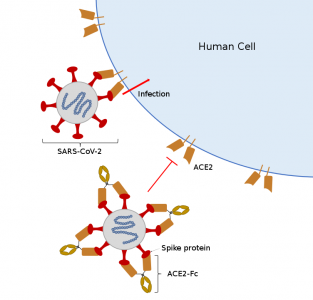
Cristina E. Davis, Ph.D.
AIMBE College of Fellows Class of 2016 For outstanding contributions to non-invasive chemical and biological sensing tools, algorithms, and applications
UC Davis Engineering Projects Fight COVID-19
Via UC Davis | May 20, 2020
SARS-COV-2, also known as COVID-19, uses its spike proteins to bind with cells. Using antibodies or an enzyme like ACE2-FC to bind with the spike proteins is key to preventing further infection. Graphic courtesy of Roland Faller.
With new seed grants from the UC Davis Office of Research’s COVID-19 Research Accelerator Funding Track (CRAFT), three teams of UC Davis engineers are applying their expertise toward the pandemic response to help people become safer, healthier and better-tested.
Mechanical and aerospace engineering (MAE) professor and chair Cristina Davis and chemical engineering (CHE) faculty Priya Shah, Karen McDonald and Roland Faller received $25,000 project awards for research that rapidly generates new insights about COVID-19, while biological and agricultural engineering (BAE) professor Gang Sun received a $5,000 small award to apply current research to the pandemic response. These proposals were chosen out from more than 100 applications and were awarded with the expectation that these projects will lead to larger collaborations.
Using Breath to Predict COVID-19 Cases
MAE professor Cristina Davis and her team are using portable devices that capture people’s breath to look for chemical and biological markers, known as biomarkers, to identify and predict the severity of COVID-19 infections.
Davis’ lab produces portable chemical sensing devices that record chemicals from the air or a person’s breath using mass spectroscopy. As part of an ongoing project with professor Nick Kenyon and associate professor Michael Schivo at the UC Davis Medical Center, the team had been conducting a clinical study with these devices to try to find early, asymptomatic biomarkers for the flu. When the pandemic began, the shift to COVID-19 was an obvious one… Continue reading.
Opioid Breathalyzer Test Developed
Via Pain News Network | October 4, 2019Chronic pain patients have grown accustomed to having their urine — and sometimes their blood and hair – analyzed for opioids and other drugs.
Someday soon they could be taking opioid breathalyzer tests.
In a small pilot study, researchers at the University of California, Davis have developed and successfully tested a device that collects minute droplets in breath that can be analyzed in a laboratory for morphine, hydromorphone (Dilaudid) and other opioids.
“Exhaled breath collection represents a painless, easily available, and non-invasive technique that would enable clinicians to make quick and well-informed decisions,” said lead author Cristina Davis, PhD, chair of the Department of Mechanical and Aerospace Engineering at UC Davis. “There are a few ways we think this could impact society… Continue reading.
Cristina E. Davis, Ph.D. To be Inducted into Medical and Biological Engineering Elite
Via AIMBE | January 20, 2016WASHINGTON, D.C.— The American Institute for Medical and Biological Engineering (AIMBE) has announced the pending induction of Cristina E. Davis, Ph.D., Professor of Mechanical and Aerospace Engineering, Mechanical and Aerospace Engineering, University of California, Davis, to its College of Fellows. Dr. Davis was nominated, reviewed, and elected by peers and members of the College of Fellows For outstanding contributions to non-invasive chemical and biological sensing tools, algorithms, and applications.
 AIMBE
AIMBE
